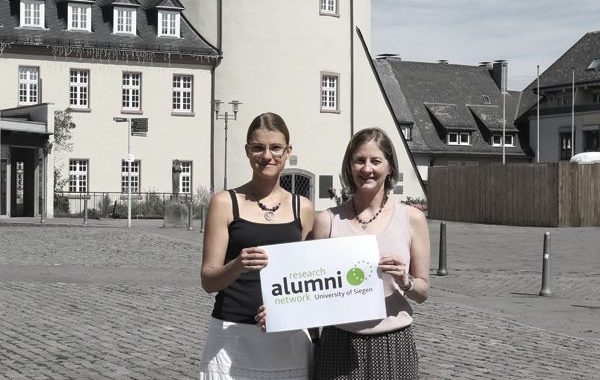The questions of how entrepreneurs recognise success and how they come to value some aspects of success rather than others are difficult, requiring consideration from multiple points of view. Two academics from different parts of the world came together to bring insight into this issue in their paper, which is now under review for publication. One of the authors is Prof. Dr. Black, a Professor of Management at Montana State University in the United States. Prof. Dr. Black has recently finished her second research visit to Siegen hosted by Prof. Dr. Ettl, who is Professor of Entrepreneurial Diversity & SME Management at the University of Siegen.
Professors Black and Ettl first met one another in 2013, at a conference organised by the FOKOS (Research Centre) in Siegen. They recognised their common interest in the topic of women entrepreneurship and started to work together. In June 2015 they presented the first results of their work at the Babson College Entrepreneurship Research Conference and the DIANA conference in the United States in 2016. Prof. Dr. Black visited the University of Siegen again to move the project forward, and in 2017, when Prof. Dr. Black hosted Prof. Dr. Ettl in Bozeman, Montana, they decided to change their approach and to reanalyse all of the data. Since then they have rewritten the paper entirely and were able to significantly expand their findings. Their recent time together in Siegen, together with their co-author Prof. Dr. Welter, enabled them to prepare the paper for submission. Together they presented it at the Institut für Mittelstandsforschung Bonn, a cooperation partner of the University of Siegen, to staff and doctoral students.
Drawing on empirical studies and theories of context and sensemaking, the authors explore in their paper how entrepreneurs recognise success in trajectories of ongoing actions. Their findings are threefold. First, perceived contextual factors shape, through personal and professional norms, individual definitions of entrepreneurial success. Second, entrepreneurial actions and their outcomes over time alter the perceived contextual factors in which the entrepreneur is embedded. Third, an individual’s definition of success is continually adapted to perceptions of her contexts. The authors integrate these themes in a success-in-context model. Their theory-building contribution makes explicit perceptions of contextual influences as entrepreneurs make sense of their experiences over time. Empirically the paper is based on 14 interviews with women entrepreneurs in Germany and the United States, analysed through thematic analysis and system dynamics causal diagramming.
When asked about the future, Prof. Dr. Ettl states that the real work begins once their paper goes through the next steps of the review process. They have also discussed about writing a paper that builds on their previous work, possibly through developing a dynamic model that would simulate the theoretical constructs that emerged from this paper.
It is clear that their time working together has resulted in a warm friendship, the fact that they both have different backgrounds, but the same interest in the topic, made this paper possible, for each author it is clear that no one of them could have written this paper alone. Another important aspect the authors mentioned is how long it can take to properly develop such a paper, and for this reason they are very grateful for the opportunity to be able to travel to see one another multiple times, in part thanks to a return for research grant from the Research Alumni Programme.
Such an academic exchange also brings cultural exchanges as well. Prof. Dr. Ettl found Prof. Dr. Black’s place in Montana to be wonderful, especially because it is not so far from Yellowstone National Park, in a wonderful landscape. Prof. Dr. Black has grown to like the Siegerland, particularly how green it is, and the hilly terrain. She also enjoys the community feel and the foods of Siegen, especially the delicious cheeses and all the berries that grow in Prof. Dr. Ettl’s garden.
